Ecosystems and Changes in Ecosystems
An ecosystem is a community of living organisms (plants, animals, and microorganisms) in conjunction with the nonliving components of their environment (such as air, water, and mineral soil), interacting as a system. Ecosystems can be as small as a pond or as large as a forest.
Components of an Ecosystem
- Abiotic factors: Nonliving components of the ecosystem such as temperature, water, sunlight, and soil.
- Biotic factors: Living components of the ecosystem including plants, animals, and microorganisms.
Types of Ecosystems
Ecosystems can be categorized into various types, such as:
- Terrestrial ecosystems: Found on land and include forests, grasslands, deserts, and tundra.
- Aquatic ecosystems: Found in water and include freshwater (lakes, rivers) and marine (oceans, coral reefs) ecosystems.
Changes in Ecosystems
Ecosystems are dynamic and can undergo natural or human-induced changes. Some common changes in ecosystems include:
- Succession: The process by which an ecosystem changes over time. It can be primary (starting from bare rock) or secondary (following a disturbance).
- Climate change: Alteration in temperature, precipitation, and other climate patterns can significantly impact ecosystems.
- Human impact: Activities such as deforestation, pollution, and urbanization can lead to changes in ecosystems.
Study Guide
To understand ecosystems and changes in ecosystems, consider the following topics:
- Identify and describe the biotic and abiotic factors in a specific ecosystem.
- Discuss the interdependence of organisms within an ecosystem.
- Explain the process of succession and give examples of primary and secondary succession.
- Analyze the impact of human activities on ecosystems and propose solutions for sustainable management.
By understanding the components of ecosystems and the factors that can lead to changes, we can work towards preserving and protecting these vital natural systems.
.◂Science Worksheets and Study Guides Fourth Grade. Ecosystems and Changes in Ecosystems
Lesson Plan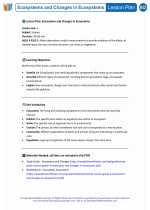 Ecosystems and Changes in Ecosystems - Bundle
Ecosystems and Changes in Ecosystems - Bundle  Study Guide
Study Guide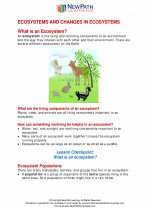 Ecosystems and changes in ecosystems
Ecosystems and changes in ecosystems  Worksheet/Answer key
Worksheet/Answer key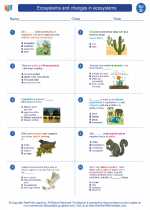 Ecosystems and changes in ecosystems
Ecosystems and changes in ecosystems  Worksheet/Answer key
Worksheet/Answer key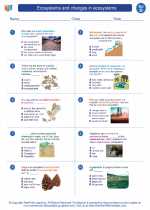 Ecosystems and changes in ecosystems
Ecosystems and changes in ecosystems  Worksheet/Answer key
Worksheet/Answer key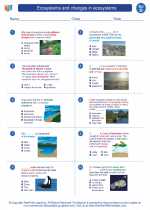 Ecosystems and changes in ecosystems
Ecosystems and changes in ecosystems  Vocabulary/Answer key
Vocabulary/Answer key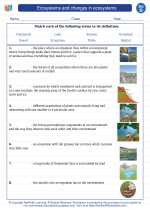 Ecosystems and changes in ecosystems
Ecosystems and changes in ecosystems  Vocabulary/Answer key
Vocabulary/Answer key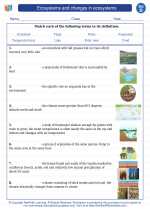 Ecosystems and changes in ecosystems
Ecosystems and changes in ecosystems  Vocabulary/Answer key
Vocabulary/Answer key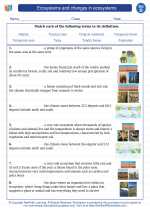 Ecosystems and changes in ecosystems
Ecosystems and changes in ecosystems 

 Study Guide
Study Guide
 Worksheet/Answer key
Worksheet/Answer key
 Worksheet/Answer key
Worksheet/Answer key
 Worksheet/Answer key
Worksheet/Answer key
 Vocabulary/Answer key
Vocabulary/Answer key
 Vocabulary/Answer key
Vocabulary/Answer key
 Vocabulary/Answer key
Vocabulary/Answer key

The resources above cover the following skills:
Life Science
There is interaction and interdependence between and among living and nonliving components of ecosystems. Students can:
Identify the components that make a habitat type unique
Compare and contrast different habitat types